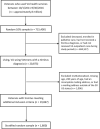The Impact of Tinnitus Severity on Work Functioning among U.S. Military Veterans with Tinnitus
- PMID: 38370516
- PMCID: PMC10872655
- DOI: 10.1055/s-0043-1770152
The Impact of Tinnitus Severity on Work Functioning among U.S. Military Veterans with Tinnitus
Abstract
Tinnitus is highly prevalent among military Veterans. Severe tinnitus can be associated with negative impacts on daily life. Veterans with severe tinnitus may also have greater difficulties in functional roles, including work. However, few studies have explicitly explored this relationship. Traumatic brain injury (TBI), also prevalent among Veterans, is associated with tinnitus and can additionally impair work functioning. This quantitative investigation used a population-based survey to assess the relationship between tinnitus severity, measured using the Tinnitus Functional Index (TFI), and the impact of tinnitus on work, measured using a composite score from the Tinnitus History Questionnaire, among a stratified random sample of VA healthcare-using Veterans diagnosed with tinnitus, with and without comorbid TBI. Analyses were weighted to account for sampling design and Veteran non-response; multiple imputation was used to account for missing data. Results indicated that for every 1-point increase in TFI score, there was an average 8% increase in the odds of reporting a high level of impact on work functioning (OR: 1.08; 95% CI: 1.06, 1.11). Veterans with a comorbid TBI diagnosis, compared with those without, were more likely to have high tinnitus-related impact on work functioning (OR: 2.69, 95% CI: 1.85, 3.91), but the relationship between tinnitus severity and the impact of tinnitus on work functioning did not differ by TBI status. These data can help researchers and clinicians understand complex symptoms experienced by Veterans with tinnitus, with and without TBI, supporting the improved provision of clinical services to these patients.
Keywords: Veterans; disability; tinnitus; traumatic brain injury; work functioning.
The Author(s). This is an open access article published by Thieme under the terms of the Creative Commons Attribution-NonDerivative-NonCommercial License, permitting copying and reproduction so long as the original work is given appropriate credit. Contents may not be used for commercial purposes, or adapted, remixed, transformed or built upon. ( https://creativecommons.org/licenses/by-nc-nd/4.0/ ).
Conflict of interest statement
Conflict of Interest None declared.
Figures
Similar articles
-
Associations Between Traumatic Brain Injury and Severity of Tinnitus-Related Functional Impairment Among US Military Veterans: A National, Population-Based Study.J Head Trauma Rehabil. 2024 May-Jun 01;39(3):218-230. doi: 10.1097/HTR.0000000000000896. Epub 2023 Sep 12. J Head Trauma Rehabil. 2024. PMID: 38709830
-
A Qualitative Study of Veterans' Perspectives on Tinnitus: An Invisible Wound.Am J Audiol. 2023 Nov 20:1-14. doi: 10.1044/2023_AJA-23-00040. Online ahead of print. Am J Audiol. 2023. PMID: 37983172
-
Mental Health Symptoms Among Veteran VA Users by Tinnitus Severity:A Population-based Survey.Mil Med. 2021 Jan 25;186(Suppl 1):167-175. doi: 10.1093/milmed/usaa288. Mil Med. 2021. PMID: 33499436 Free PMC article.
-
Rehabilitation Service Needs and Preferences among Veterans with Tinnitus: A Qualitative Study.Semin Hear. 2023 Jun 22;45(1):29-39. doi: 10.1055/s-0043-1770138. eCollection 2024 Feb. Semin Hear. 2023. PMID: 38370519 Free PMC article. Review.
-
Systematic Review, Meta-Analysis, and Population Attributable Risk of Dementia Associated with Traumatic Brain Injury in Civilians and Veterans.J Neurotrauma. 2023 Apr;40(7-8):620-634. doi: 10.1089/neu.2022.0041. Epub 2022 Dec 8. J Neurotrauma. 2023. PMID: 36305374 Free PMC article.
Cited by
-
Establishing a Comprehensive Tinnitus Care Pathway-Part 1: Essential Components.Semin Hear. 2025 Mar 5;45(3-04):284-295. doi: 10.1055/s-0045-1804519. eCollection 2024 Aug. Semin Hear. 2025. PMID: 40256371 Review.
References
-
- Andersson G, Edvinsson E.(2009). Mixed feelings about living with tinnitus: a qualitative study 6 (1), 48–54. Accessed June 2, 2023 at: https://doi.org/10.1080/16513860801899355
-
- Axelsson A, Sandh A.(2009). Tinnitus in noise-induced hearing loss 19 (4), 271–276. Accessed June 2, 2023 at: https://doi.org/10.3109/03005368509078983 - PubMed
-
- Bartels H, Middel B, Pedersen S S, Staal M J, Albers F WJ. The distressed (Type D) personality is independently associated with tinnitus: a case-control study. Psychosomatics. 2010;51(01):29–38. - PubMed
-
- Beck J E, Zaugg T L, Egge J L, Lima E N, Thielman E J.Progressive Tinnitus Management at two Veterans Affairs medical centers: clinical implementation with modified protocols Am J Audiol 201928(1S):162–173. - PubMed



